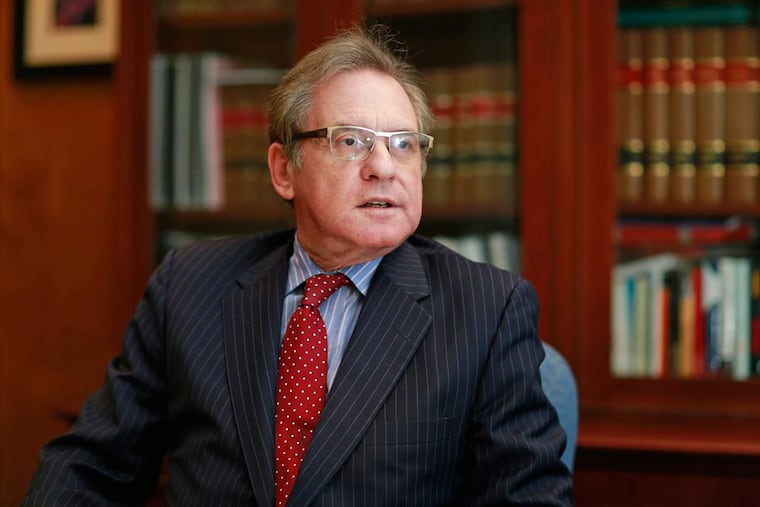A plan to help the city's pension woes: Buyouts
City Controller Alan Butkovitz thinks he has a solution for Philadelphia's staggeringly underfunded pension fund: buyouts.

City Controller Alan Butkovitz thinks he has a solution for Philadelphia's staggeringly underfunded pension fund: buyouts.
Butkovitz is proposing that the city offer up-front cash payments to retirees, who, if they took the option, would surrender their lifelong pensions.
The payments would represent only a portion - say, 50 percent - of what a retiree could expect to receive over a lifetime. Still, a fair number of retirees might be enticed by the prospect of a cash windfall they could invest on their own, Butkovitz said.
"This would give people the opportunity to start a business," he said. "Or do something that could potentially change their life and provide financial security long-term. And, of course, they could convert it into an annuity."
Such buyouts could benefit the city by dramatically reducing the pension fund's overall liability. The fund is $5.7 billion short of its $11 billion obligation to city workers' pensions.
"There's a persistent concern in the city about getting control of pension costs and a lot of things have been tried that were nibbling around the edges," Butkovitz said. "So, it seems like the environment is ripe for ideas that would actually result in significant savings."
Finance director Rob Dubow is intrigued by the buyout concept.
"It's an interesting idea that deserves further examination," he said.
While not yet adopted anywhere, public-pension buyouts are gaining attention nationwide as cities and states grapple with growing pension deficits.
Illinois lawmakers, for instance, are considering lump-sum payouts to solve their state's pension crisis. Nashville considered a buyout program last year, but ultimately decided against it.
"People are looking for different solutions," said Greg Mennis, director of the public sector retirement systems project at Pew Charitable Trusts.
He acknowledged that government buyout programs face high hurdles.
"It's complex," he said, " . . . striking a balance between boosting the city's finances and maintaining workers' security. The outcomes are so uncertain."
Butkovitz is proposing that the city offer buyouts to 31,000 city retirees and 2,500 active employees who are covered by the city's oldest and costliest pension plan, referred to as Plan 67. The city's actuary is preparing an analysis to determine the savings and cost of a buyout.
City Council would need to approve any buyout.
At the moment, Butkovitz has no recommendation as to what the buyout percentage should be. "My hunch is that it would be worthwhile if even one person took it, but I need to see that statistically tested," Butkovitz said.
A preliminary run of numbers presented during the Feb. 25 pension board meeting showed that if every past and present employee covered under Plan 67 took a 50 percent buyout, it could reduce the city's liability by $3.7 billion.
There is still the question of how to pay for the buyouts.
Taking the cash from the city's current pension assets would severely drain the fund, city actuary Ken Kent said at last month's pension board meeting.
Butkovitz is suggesting that the city sell bonds to cover the buyouts. The debt service on those bonds would reduce the benefit of the program.
Butkovitz wants to target retirees covered by Plan 67 because it represents $5 billion of the fund's $5.7 billion shortfall. Its terms are particularly generous.
The plan covers police and fire employees hired before 1988, union-represented municipal employees hired before 1992, and nonunionized employees hired before 1987.
Police officers and firefighters covered by the plan can retire at 45 with a full lifetime pension. Other municipal employees can retire at 55.
Police and fire employees can receive up to 100 percent of their final highest salary. Municipal employees can receive up to 80 percent of the average of their three highest salaries.
More recent hires not covered under Plan 67 must put in longer time on the job and can expect to receive more modest pensions. Their plans, on average, are more than 72 percent funded.
"The city is up to date, more or less, with anybody who is in current plans," Butkovitz said during last month's pension board meeting. "So, our problem is that we have to do something about the old plans. . . . One of the few things you can do about the old plans is reach a settlement with people who are in the old plans."
Individual settlements would be determined by a person's annual pension and life expectancy. Butkovitz gave a simplified example of a city employee, with a life expectancy of 30 additional years, receiving a $30,000 annual pension. That employee could expect $900,000 in retirement. A buyout at 50 percent would provide $450,000 in a lump-sum check.
Given the sudden large sums of money people stand to get, Butkovitz wants to make sure that anyone who takes the buyout receives financial counseling.
"You run into the same types of issue that you do with big lottery winners in that big winners sometimes don't know what to do with a big influx of money," Butkovitz said.
215-854-5520 @InqCVargas